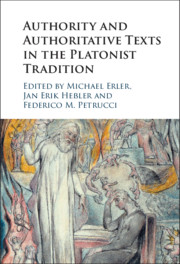Book contents
- Authority and Authoritative Texts in the Platonist Tradition
- Authority and Authoritative Texts in the Platonist Tradition
- Copyright page
- Contents
- Figures
- Contributors
- Acknowledgements
- Abbreviations
- Introduction
- Chapter 1 Xenocrates’ Invention of Platonism
- Chapter 2 An Iconography of Xenocrates’ Platonism
- Chapter 3 Arcesilaus’ Appeal to Heraclitus as a Philosophical Authority for His Sceptical Stance
- Chapter 4 Authority beyond Doctrines in the First Century bc
- Chapter 5 Authority and Doctrine in the Pseudo-Pythagorean Writings
- Chapter 6 Constructing Authority
- Chapter 7 Plutarch’s E at Delphi
- Chapter 8 Aristotle’s Physics as an Authoritative Work in Early Neoplatonism
- Chapter 9 Conflicting Authorities? Hermias and Simplicius on the Self-Moving Soul
- Chapter 10 Kathēgemōn: The Importance of the Personal Teacher in Proclus and Later Neoplatonism
- Chapter 11 ‘In Plato we can see the bad characters being changed by the good and instructed and purified.’
- References
- Index Locorum1
- General Index
Chapter 6 - Constructing Authority
A Re-examination of Some Controversial Issues in the Theology of Numenius
Published online by Cambridge University Press: 19 February 2021
- Authority and Authoritative Texts in the Platonist Tradition
- Authority and Authoritative Texts in the Platonist Tradition
- Copyright page
- Contents
- Figures
- Contributors
- Acknowledgements
- Abbreviations
- Introduction
- Chapter 1 Xenocrates’ Invention of Platonism
- Chapter 2 An Iconography of Xenocrates’ Platonism
- Chapter 3 Arcesilaus’ Appeal to Heraclitus as a Philosophical Authority for His Sceptical Stance
- Chapter 4 Authority beyond Doctrines in the First Century bc
- Chapter 5 Authority and Doctrine in the Pseudo-Pythagorean Writings
- Chapter 6 Constructing Authority
- Chapter 7 Plutarch’s E at Delphi
- Chapter 8 Aristotle’s Physics as an Authoritative Work in Early Neoplatonism
- Chapter 9 Conflicting Authorities? Hermias and Simplicius on the Self-Moving Soul
- Chapter 10 Kathēgemōn: The Importance of the Personal Teacher in Proclus and Later Neoplatonism
- Chapter 11 ‘In Plato we can see the bad characters being changed by the good and instructed and purified.’
- References
- Index Locorum1
- General Index
Summary
In a recent article, George Boys-Stones (2018b) offered an interesting definition of the Imperial Platonist conception of authority. According to him, contrary to the members of the other Hellenistic schools, the Middle Platonists do not aim to acquire a sum of propositional knowledge to be preserved within the school. Plato’s authority was for them not that of a founder of a school, but that of a man who had seen the intelligible Forms and discovered a truth to which all subsequent Platonists aspired. According to Boys-Stones, this conception of authority goes hand in hand with a certain epistemological perspective, the traces of which we can find in the fragments of Numenius, most notably in how he thinks of the relation between the second and the third God (fr. 11 des Places). The perspective of this paper is slightly different.
Information
- Type
- Chapter
- Information
- Authority and Authoritative Texts in the Platonist Tradition , pp. 130 - 148Publisher: Cambridge University PressPrint publication year: 2021
Accessibility standard: Unknown
Why this information is here
This section outlines the accessibility features of this content - including support for screen readers, full keyboard navigation and high-contrast display options. This may not be relevant for you.Accessibility Information
- 2
- Cited by
